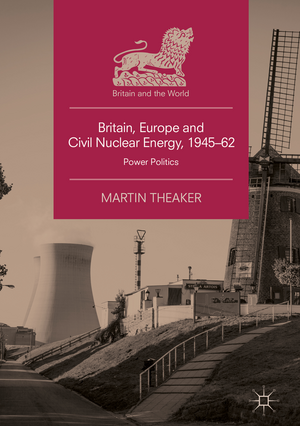Britain, Europe and Civil Nuclear Energy, 1945–62: Power Politics: Britain and the World
Autor Martin Theakeren Limba Engleză Hardback – 23 mar 2018
| Toate formatele și edițiile | Preț | Express |
|---|---|---|
| Paperback (1) | 633.50 lei 6-8 săpt. | |
| Springer International Publishing – 30 ian 2019 | 633.50 lei 6-8 săpt. | |
| Hardback (1) | 638.90 lei 6-8 săpt. | |
| Springer International Publishing – 23 mar 2018 | 638.90 lei 6-8 săpt. |
Din seria Britain and the World
-
 Preț: 261.24 lei
Preț: 261.24 lei -
 Preț: 384.31 lei
Preț: 384.31 lei -
 Preț: 455.89 lei
Preț: 455.89 lei - 18%
 Preț: 785.00 lei
Preț: 785.00 lei - 15%
 Preț: 499.92 lei
Preț: 499.92 lei -
 Preț: 394.51 lei
Preț: 394.51 lei - 15%
 Preț: 695.85 lei
Preț: 695.85 lei -
 Preț: 391.61 lei
Preț: 391.61 lei -
 Preț: 391.61 lei
Preț: 391.61 lei - 18%
 Preț: 784.79 lei
Preț: 784.79 lei - 15%
 Preț: 584.43 lei
Preț: 584.43 lei - 18%
 Preț: 723.56 lei
Preț: 723.56 lei -
 Preț: 387.75 lei
Preț: 387.75 lei -
 Preț: 383.33 lei
Preț: 383.33 lei -
 Preț: 326.64 lei
Preț: 326.64 lei -
 Preț: 388.72 lei
Preț: 388.72 lei - 15%
 Preț: 643.84 lei
Preț: 643.84 lei - 18%
 Preț: 782.42 lei
Preț: 782.42 lei - 8%
 Preț: 591.14 lei
Preț: 591.14 lei -
 Preț: 399.29 lei
Preț: 399.29 lei -
 Preț: 390.63 lei
Preț: 390.63 lei - 8%
 Preț: 484.59 lei
Preț: 484.59 lei - 15%
 Preț: 585.26 lei
Preț: 585.26 lei -
 Preț: 391.61 lei
Preț: 391.61 lei -
 Preț: 276.13 lei
Preț: 276.13 lei - 15%
 Preț: 646.62 lei
Preț: 646.62 lei - 15%
 Preț: 527.15 lei
Preț: 527.15 lei -
 Preț: 384.86 lei
Preț: 384.86 lei - 18%
 Preț: 789.35 lei
Preț: 789.35 lei -
 Preț: 391.61 lei
Preț: 391.61 lei - 18%
 Preț: 784.61 lei
Preț: 784.61 lei -
 Preț: 242.17 lei
Preț: 242.17 lei -
 Preț: 385.84 lei
Preț: 385.84 lei -
 Preț: 394.51 lei
Preț: 394.51 lei -
 Preț: 398.53 lei
Preț: 398.53 lei - 15%
 Preț: 647.40 lei
Preț: 647.40 lei - 15%
 Preț: 642.51 lei
Preț: 642.51 lei
Preț: 638.90 lei
Preț vechi: 751.65 lei
-15% Nou
Puncte Express: 958
Preț estimativ în valută:
122.27€ • 127.18$ • 100.94£
122.27€ • 127.18$ • 100.94£
Carte tipărită la comandă
Livrare economică 14-28 aprilie
Preluare comenzi: 021 569.72.76
Specificații
ISBN-13: 9783319739267
ISBN-10: 3319739263
Pagini: 309
Ilustrații: XIX, 297 p. 5 illus.
Dimensiuni: 148 x 210 mm
Greutate: 0.53 kg
Ediția:1st ed. 2018
Editura: Springer International Publishing
Colecția Palgrave Macmillan
Seria Britain and the World
Locul publicării:Cham, Switzerland
ISBN-10: 3319739263
Pagini: 309
Ilustrații: XIX, 297 p. 5 illus.
Dimensiuni: 148 x 210 mm
Greutate: 0.53 kg
Ediția:1st ed. 2018
Editura: Springer International Publishing
Colecția Palgrave Macmillan
Seria Britain and the World
Locul publicării:Cham, Switzerland
Cuprins
1: Introduction.- .- 2: Britain and the Limits of Atomic Independence, 1945-53.- 3: Britain and ‘Atoms for Peace’, 1953-55.- 4: Finding a Buyer: Atomic Exports, 1953-57.- 5: Diverging Paths: Euratom and the OEEC, 1955-58.- 6: Britain, the United States and Euratom, 1958-60.- 7: Atomic Energy, the Cold War and the EEC, 1960-62.- 8: Conclusion.
Notă biografică
Martin Theaker studied at the University of Birmingham, UK, before obtaining his PhD in History from Trinity Hall, University of Cambridge, UK, in 2016. He has authored several articles on Britain’s nuclear history and now works in industry in the UK.
Textul de pe ultima copertă
This book examines the role played by civil nuclear energy in Britain’s relationship with Europe between the end of the Second World War and London’s first application to join the European Communities. Tracing the development of the British nuclear programme as it emerged as a global leader in constructing the world’s first atomic power stations, it analyses how the threat of energy shortages throughout the 1950s presented ministers with a golden opportunity to utilise nuclear cooperation as an instrument to influence the political shape of Europe. Importantly, this book will show how this chance was missed by ministers due to a combination of disorganization and diplomatic pressure, as well as a perennial lack of domestic resources. In so doing, this book joins the long-disconnected historiographies of European integration and nuclear energy to offer a new perspective on both scholarly fields.
Caracteristici
Explores the connections between Britain’s civil nuclear diplomacy and European integration in the immediate post-war period Highlights the importance of nuclear energy in diplomatic relations and the tensions between national politics and international scientific collaboration Includes new research from archives in Britain, America, Canada and Germany
